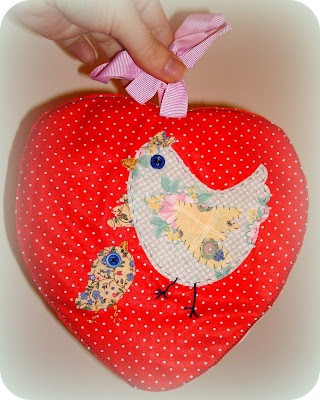
Sunday, February 19, 2012
How to make a pom pom

Sunday, August 21, 2011
On Zombies
 |
| 'Zombie Bunny', made from pattern in Zombie Felties, Nicola Tedman & Sarah Skeate, 2010 |
Partly this popularity could be attributed to series of successful films about zombies, and their excellence as a video game subject. But there must be more to this. The fact there are so many zombie films is because of their instant popularity which cannot be due to the films alone. I like Dan Birlow's analysis of their popularity. He accesses various theories such as that zombies reinforce paranoid belief systems, or that it is a like of being scared of turning into one that makes them popular but then comes to the conclusion that is because people like imagining themselves as survivors in an apocalyptic situation.
Somehow though zombies can also be amusing. This humour can be seen in Nicola Tedman's and Sarah Skeates excellent book Zombie Felties: How to raise 16 gruesome creatures from the undead. I have been playing with this book and used it to make the following felt zombies:
It is lots of fun and the patterns are easy to follow. I recommend it heartily to all who wish to make their own fleet of mini-zombies.
Saturday, April 9, 2011
Happy Mothers Day

The chicken design I sketched from somewhere, but I forget where. It's a simple applique but quite a cute effect I think. The inside is padded along with a piece of cardboard to keep it stiff.
Thursday, March 31, 2011
Tuesday, March 8, 2011
On String
String (/strɪŋ/) is a wonderful thing. At first it seems mundane, even boring, but the slightest investigation reveals that string may very well be the most versatile and useful invention made by man. It has shaped our physical and linguistic world. We love string.
Its versatility has led it to infiltrate our language. String is highly flexible, in more ways than one. String is used in musical instruments, necklaces, bows, and sports equipment. You can use it to fly kites, tie shoelaces, bind books, control puppets and even to tie things together.
“To go to heaven in a string” refers, rather jovially, to being hanged. The Oxford English Dictionary places the use of this phrase to 1710 with the publication of T. Ward’s The English Reformation and claims it referred originally to the Jesuits who were hanged during the reign of Elizabeth I.(1) After this point the use of the word ‘string’ in describing a hanging became common.
String is a device that allows you to control the world around you. You can string someone up, lead someone by a string, string things together, string someone along, and pull the strings. ‘No strings attached’ are the failsafe watchwords of contracts.
The word ‘string’ has been appropriated for all kinds of new theories and inventions, including, string theory, cosmic string, brock strings, string galvanometers and G-strings. This list is by no means exhausitive.
String is demonstrably all around us. It's in our products, our theories and our language. Imagine a world without string and it is a lesser world at that. Without string we'd all be strung out to dry.
2 Ibid













